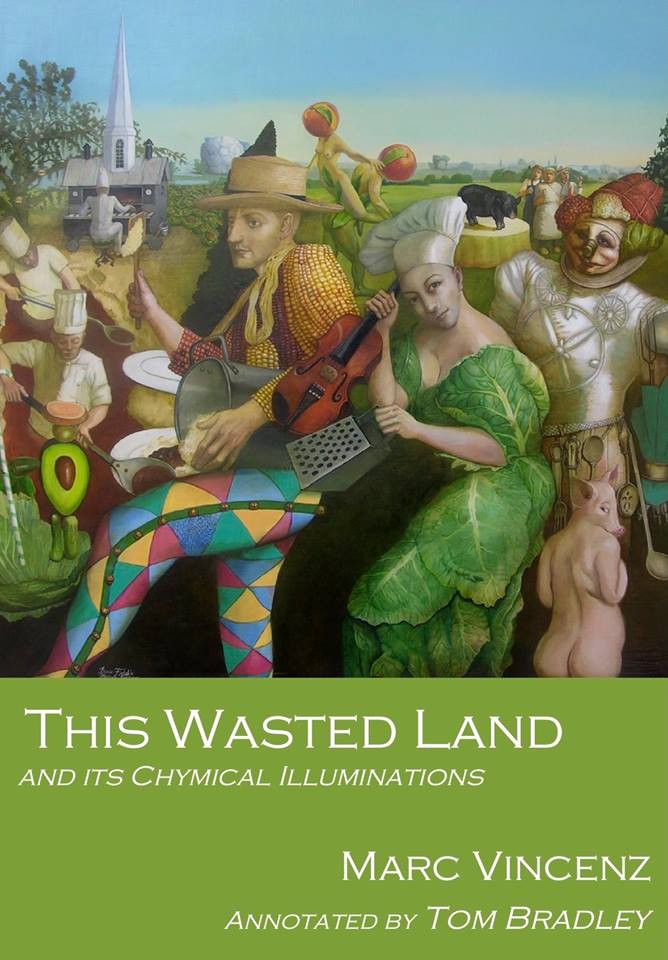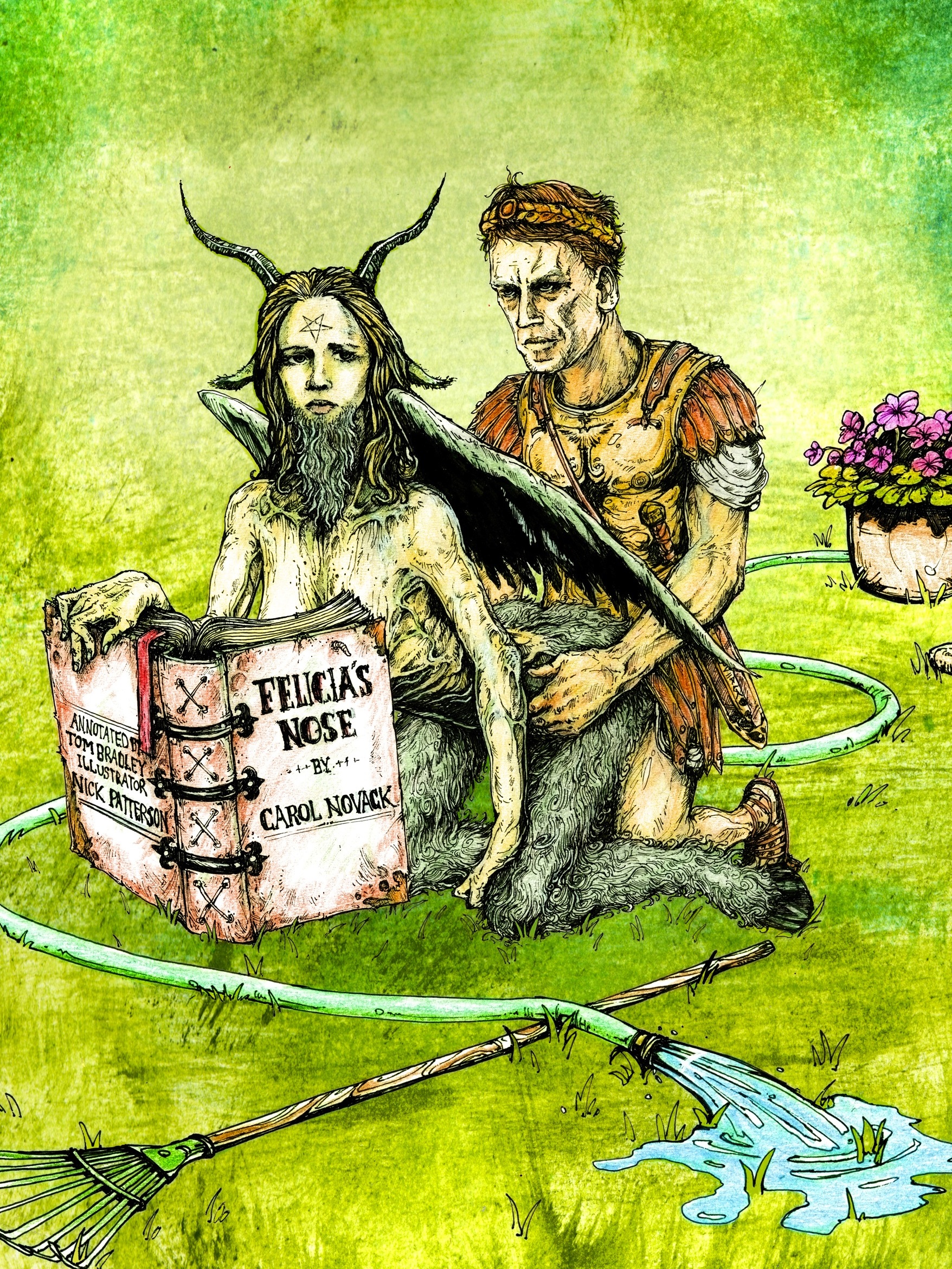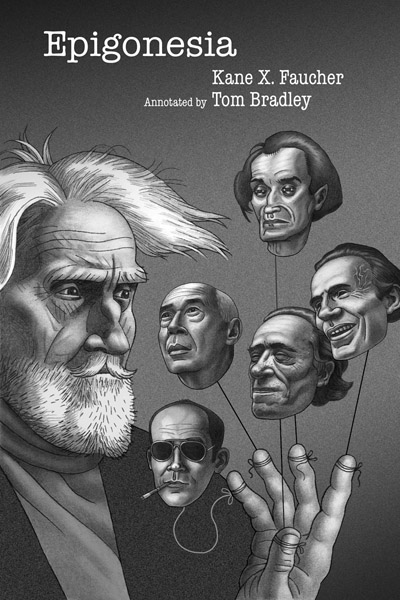Annotated Works

Stunned reaction from Midwest Book Review
Rave at Philadelphia Review of Books
Tom Bradley has annotated this book in the strange way he did Epigonesia and Felicia's Nose. He strip-mines the pseudepigrapha and snuffles into Mariolatry's odd pastel nooks, where the sense of smell prevails over all others. As a precaution, Bradley doesn't neglect to conjure the crone initiatrix of the Vama Marga who teaches prophets, seers and revelators to control their gag reflex. Gradually, something like a novel materializes among the endnotes. A strange figure emerges: Siegfried Tolliot, who, in 1958, shared intimacy with Ezra Pound at Saint Elizabeth's insane asylum in Washington, D. C. The result is that rarity of rarities: a new genre, situated in real time as the poet's bright lyricism contends with the cackling paranoia of his annotator. It all culminates in a 300-item bibliography and an index of 900 entries, citing everyone from Heinrich Cornelius Agrippa to Zosimos of Panopolis.
"The masters of High Farce, like Chaucer, Cervantes, Oscar Wilde, Mark Twain, and Monte Python, would no doubt wrap this Annotator in their brotherly cloaks."
--Philadelphia Review of Books
"Tom Bradley's copious and critical annotations give us the capricious erudition of a T. S. Eliot in March Hare guise, whilst delivering such mirthfulness as would befit Boccaccio."
--Umit Singh Dhuga, The Battersea Review
"Bradley’s multilayered, alchemical annotations, anchor this book—the poem, the notes, the expansive bibliography – deliver a rare multiverse of a read. Phenomenal, scintillating."
--Allison Hedge Coke, Winner of the American Book Award

Posthumous collaboration with Carol Novack: FELICIA'S NOSE.
"...Being a writer, Carol's method of self-excavation was literary, and she recruited my help, two shovels being better than one...She wanted me to dig under her characters and situations, to dissect her names, numbers, references, to turn her allusions, both deliberate and unconscious, inside-out. Carol wanted a running commentary that furtively pursued—she cringed at the word—psychoanalytical strategies. She envisaged an infestation of ten-point type skittering along the bottom of her novel like army ants underfoot.
"'We need a literal subtext!' she cried..."
Cover art and illustrations by Nick Patterson.
"A dog-whistle palimpsest, a riddling box of questions left unfinished at the author's death, a Winchester Mystery House of a book with graffiti notes from an alternative Zoharistic universe and illustrations transcribed from the depths of Bohu-Tohu, Felicia's Nose is an experimental novel based on the "call and response" of an arcane Blues--the eternally absent author unraveling a tale from the other side of life, and the very much alive Tom Bradley answering each movement of the planchette with a drum roll cursive freighted with sentiments worthy of Sabattai Zvei.
--Jesse Glass, author of Lost Poet

Kane X. Faucher has written Ezra Pound back to life. By various alchemical means, the latter performs the same favor for Henry Miller, Hunter Thompson, Charles Bukowski, Antonin Artaud and Louis-Ferdinand Celine. These authors are dumped in the present, and each is caused to suffer symbolic retribution worthy of Dante's Inferno, based on the particular excess that came to define his literary persona.
Celine returns with no memory of the French language. Bukowski is cursed with an inability to drink alcohol. Artaud behaves insanely, but no one seems to notice except for teenagers who think it's "awesome." Miller has erectile dysfunction, while Thompson is expected to write legit journalism.
Each of the authors speaks in his own voice--and this is the amazing thing, because Kane X. Faucher is without a doubt the greatest literary parodist in existence. His Celine, in particular, is uncanny to the point of making one superstitious at times.
The quincunx of notorious authors gives Epigonesia a kind of literary star-power. Meanwhile, Tom has recruited himself to provide commentary in an elaborate substructure of footnotes. He seems to have discovered the manuscript on a rickety old laptop which Faucher left behind upon his tragic suicide. Epigonesia turns out to be an extended suicide note. Via Tom's footnotes, the late Kane X. Faucher's downfall is explicated, also narrated like a mystery story with rising action, climax, denouement--all that tight structural stuff one would never expect to be couched in scholarly apparatus.
The spoiler comes at the end of the book. Nested in the epilogue is another narrative tier. The pharmaceutical company Metapharm has been testing a suite of literary- and literacy-based drugs. Faucher and Bradley have guinea-pigged themselves in a clinical trial.
This results in the collaborative working of the text, and explains the increasing paranoia in the footnotes, as the suicide note develops into a real-time personal attack, mounted from the grave by Faucher, upon annotator Bradley.